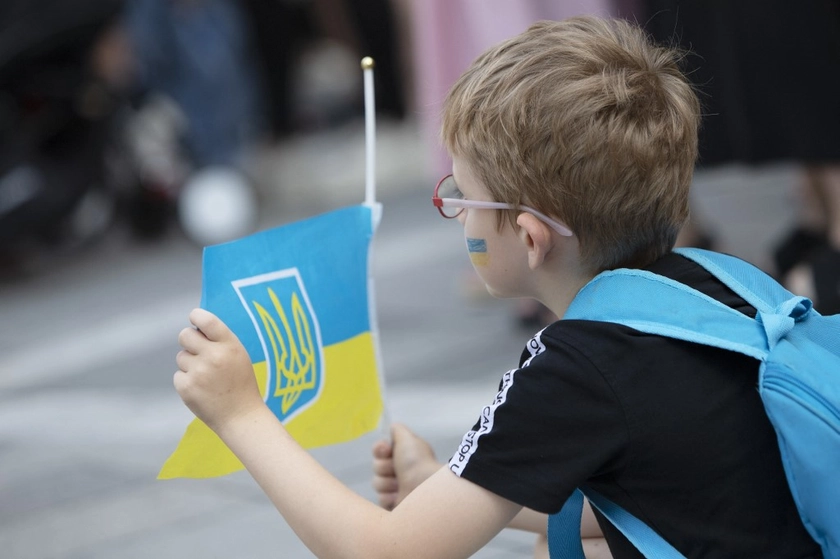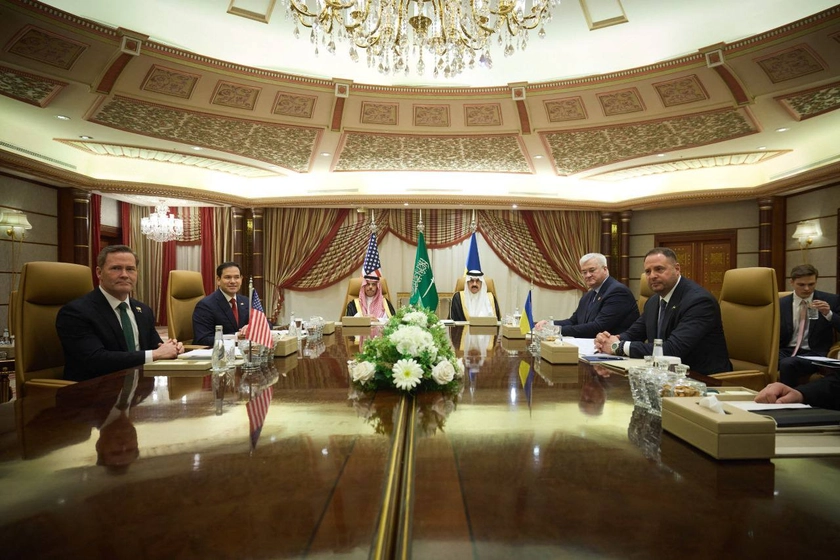The US Department of Defense on Wednesday announced that the recently reported $2.2 billion tranche of military to aid Kyiv will include missiles for Patriot and NASAMS air defense systems.
“DoD is announcing a significant package of air defense interceptors using approximately $2.2 billion in Ukraine Security Assistance Initiative (USAI) funds. This funding will be used to purchase interceptors for PATRIOT and NASAMS air defense systems for Ukraine,” the statement from the Pentagon reads.
JOIN US ON TELEGRAM
Follow our coverage of the war on the @Kyivpost_official.
“As a result, Ukraine will receive the interceptors it urgently needs to defend its population and critical infrastructure from Russian aerial attacks.”
The package represents the administration of Joe Biden’s 16th tranche of equipment to be delivered from US military inventories since August 2021. The funding that made this latest round possible cleared Congress after a long partisan stalemate over the winter.
The most immediate shipment, however, funded by Biden’s $150 million presidential draw-down authority, will include the following, according to the statement:
- Missiles for HAWK air defense systems
- Ammunition for High Mobility Artillery Rocket Systems (HIMARS)
- 155mm and 105mm artillery rounds
- 81mm mortar rounds
- Tube-launched, Optically-tracked, Wire-guided (TOW) missiles
- Javelin and AT-4 anti-armor systems
- Small arms ammunition and grenades
- Demolition equipment and munitions
- Tactical air navigation (TACAN) systems and aircraft support equipment
I am grateful to @POTUS Joe Biden, both parties in Congress, and the entire American people for today’s military aid packages.
— Volodymyr Zelenskyy / Володимир Зеленський (@ZelenskyyUa) July 3, 2024
Additional air defense, artillery, anti-tank weapons, and other critical items, as well as funds to purchase Patriot and NASAMS missiles, will…
🇺🇸 Government announced its latest aid package for #Ukraine 🇺🇦$150 Millions under PDA & $2.2 billions under USAI. USAI funding will be used to purchase interceptors for PATRIOT & NASAMS AA systems. https://t.co/iHjOWmmlhc
— Midobecker 🇺🇸🇮🇹🇺🇦 🇮🇱🇹🇼🇪🇺🏴☠️ (@midobecker_1) July 3, 2024
Coincidentally a report about the HAWK system 🧵⬇️ pic.twitter.com/6cBiwrYyR4
NATO vows to give Ukraine €40 billion per annum, but the US says it can’t make any promises this year
On Wednesday, NATO countries signed a pledge to keep supplying Ukraine with around €40 billion in weapons next year, AFP reported, quoting diplomats, but said that some bite was taken out of the agreement due to the inability of the US to promise what would happen after November presidential and congressional elections.

Mr. Musk, How Much Is a Ukrainian Child Worth?
Scheduled to be unveiled at the NATO summit in Washington next week, the idea was pitched by outgoing NATO chief Jens Stoltenberg as a way to solidify Western aid for Kyiv in its war with Russia after both the US and other elections, and after he is replaced.
From the American point of view, the trouble with any international treaty is that Washington considers them to be constitutionally binding if ratified by the US Senate, whereas many other countries view them more as guidelines for their respective legislatures to consider. NATO diplomats said that the United States insisted that this latest pledge – which in itself is not legally binding -- should be reviewed next year, after the November elections.
The US delegation noted that it was not legally possible for its government to commit any future administrations to spending, diplomats said.
The idea, the sources said, was to “split contributions more equitably,” AFP reported a common refrain in US Republican challenger Donald Trump’s campaign rhetoric. One diplomat said there was a reference to "fair burden sharing" in the final text and the aim to contribute more proportionally, but no mention of using GDP as a scale.
UN stands behind Ukraine, and its Russian envoy says Trump cannot end the war “in a day”
The president of the UN General Assembly, Dennis Francis, said that this year’s elections in the US and worldwide will not change the body’s stance on the invasion of Ukraine because “it is a matter of law,” he told the Associated Press on Wednesday.
“No country has the right to invade another country,” Francis said. He added, diplomatically: “It will be for us to witness over time what the implications of the results of those elections are for the entire international system and in particular for the state of Ukraine.”
On Monday, Moscow’s envoy to the Assembly, Vassily Nebenzia, said that Trump’s claims that he could end the war in Ukraine in a day, a boast he repeated in the latest presidential debate, were unfounded.
“The Ukrainian crisis cannot be solved in one day,” Nebenzia said at a news conference when asked about Trump’s pledge. “That’s objective.”
Nebenzia suggested there was an opportunity to end the fighting in April 2022, but scornfully dismissed any discussions that took place at last month’s peace summit in Switzerland where 80 countries agreed that Ukraine’s “territorial integrity” must be the basis for a deal.
The Kremlin has insisted it has had no contact with the former US president about separate strategies for peace. Nor has Trump outlined any plans on how he would achieve this, and indeed sidestepped the moderator’s questions at the CNN-hosted debate about Ukraine’s right to territorial integrity.
In another recent example, in a March interview with right-wing political commentator Sean Hannity on Fox News, Trump proclaimed:
“There’s a very easy negotiation to take place. But I don’t want to tell you what it is because then I can’t use that negotiation; it’ll never work. But it’s a very easy negotiation to take place. I will have it solved within one day, a peace between them. Now that’s a year and a half. That’s a long time. I can’t imagine something not happening.”
Trump says he can end the Russia-Ukraine war in one day. Russia's UN ambassador says he can't https://t.co/HiFjCCau2W
— 2025 A Space Nightmare Odyssey (@Linderr) July 3, 2024
You can also highlight the text and press Ctrl + Enter














